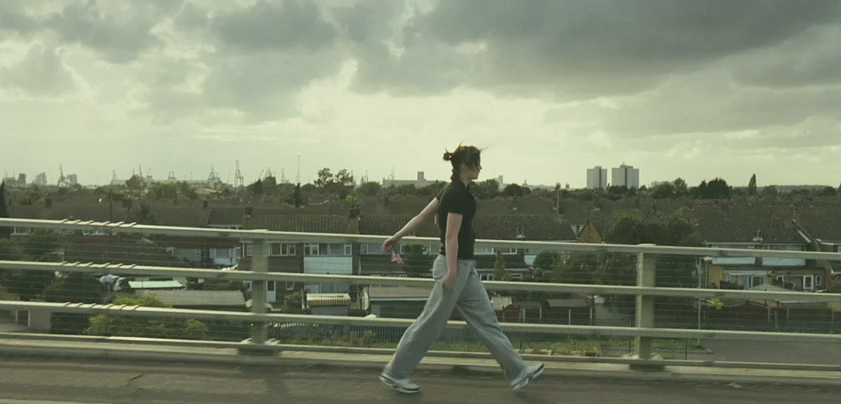Modern Britain has, by reputation, the most depraved white underclass this side of Cherepovets. The data on educational attainment, employment, criminality, and other markers of social well-being indicates that this group has devolved to a far worse condition than their counterparts in America, which would seem to take some doing. Fish Tank is set in this milieu. It is a movie of the probing, grimly realistic, not particularly concerned with being entertaining type that is more common in the U.K. than it is here. One feels that is good work, that it approaches its material in a more original and intelligent way than most writers and directors can muster, and that it confronts sides of life that a mature adult ought to be able to look at unflinchingly and have some knowledge of and ideas about. Whatever humor or joy is in it, or is supposed to be in it, is inaccessible to me, and I was glad enough to move on from it. That said, its director, Andrea Arnold, has a real talent for conceiving plots and for carrying the most potentially unpleasant scenarios much farther than one suspects most mainstream artists and audiences have the nerve to pursue, or stand. One of her short films, called Wasp, that was included in the Criterion DVD, was very good in this nerve-wracking sort of way.
The people in these stories are perhaps a little too authentic--their lives are so hopeless and joyless and artless that there is no ground (or air) on which to feel anything that might draw me to care about them or find them interesting.
As a rule-following middle level person terrified of the consequences of ever stepping out of line with regard to anything, I was struck by how much stress I felt just watching the various criminally negligent behaviors and potentially violent or sexually dangerous situations in which the underclass persons continually found themselves (or brought upon themselves), which was probably greater than what the characters would have felt at the time. In these Andrea Arnold movies a lot of the stress originates from the circumstance that these situations involve children, or teenagers that the respectable classes still consider to be children who require to be protected in matters of sex and violence at the very least, and we see them decidedly not being protected from those things. If you are the sort of person however whose instincts for any rawer and more spontaneous brand of violence and sexuality, assuming you ever had any, never achieved expression in actual life and died stillborn somewhere in your desiccated soul long before you were twenty-five, it is disconcerting to see them alive in other people, even if it is, by the standards you have adopted as sacred, destroying their lives.
I always thought The Remains of the Day was the best of the old Merchant/Ivory movies. I thought that their Forster versions were all right at the time, though Howards End seems either to have dated noticeably or does not hold up well on a second viewing, but that their Henry James adaptations were kind of pointless. I am not an expert on Henry James either, but even after reading and probably not understanding The Golden Bowl, I was pretty sure that whatever they were going for in the movie was not really what the book was about either. This (Remains) is an almost perfect contrast to Andrea Arnold, especially given the English setting of both (Fish Tank was set in Essex, and I believe the house in Remains is supposed to be in Oxfordshire), being highly mannered, even prissy, self-consciously literate and historical and mature and serious. Acting on an impulse, or even being so undisciplined as to allow oneself to have any, is beyond unthinkable. After seeing Fish Tank, this feels like a lightweight production, perhaps because it is, perhaps because it is so doggedly old-fashioned in its artistic values that one feels it cannot possibly be addressing anything important. However I still like it, and I think there is a good deal suggested in it that one can talk about, even if the film itself does not face these matters with a penetration or intensity that would be satisfactory to us.
According to my wife I talk and act just like the Anthony Hopkins character in this movie (the talking with a Mid-Atlantic accent), which I don't think is meant to be a compliment, though at least the guy is about as good as he can be at his job, and he has a well-developed sense, albeit an extremely narrow and limited one, of who he is. I suppose one of the questions suggested by the movie is whether it is better that people like Stevens, and myself, should be exposed to a slightly more expansive view and understanding of the world, and live as confused, undefined men, or be narrowly brought up to do particular tasks, for which they are supremely fitted, extremely well, but be at the same time unable to act as free men with political, or even very much moral agency. The movie, not surprisingly, I think would say that Stevens would have definitely benefited from some liberal arts type training in his upbringing, that this would have been good for society and helped to avoid some wrongs, etc. And he does give indication of desiring improvement in his education and speech and level of culture in the movie, though it is clear he does not have much real sense of the best way to go about it. However that was 20 years ago, when Western affluence vis-a-vis the rest of the world allowed us the luxury--which was never exactly indulged in too excessively even then--of wondering whether the servant class ought to be afforded a greater degree of intellectual development. The trend since then has been so severely in the other direction, to the point that even most people with college degrees do not seem to have any sense of why liberal arts departments even exist in colleges, or ever existed, at least since the invention of science.


No comments:
Post a Comment